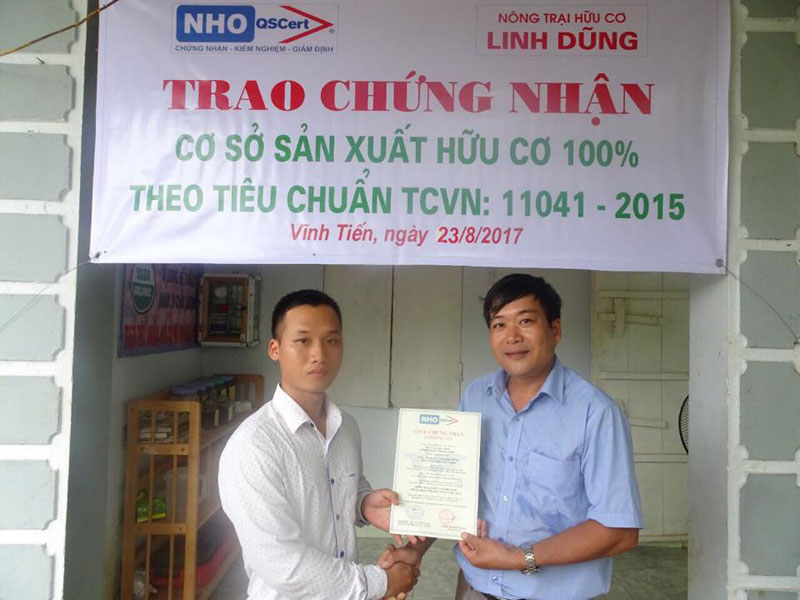
HBO – Nguyen Hong Yen, who manages the Linh Dung organic farm in Dong Ngoai hamlet of Vinh Tien commune (Kim Boi district), is considered the first Vietnamese planting organic citrus. His farm’s citrus fruits were recently recognised by the NHO- QSCERT as organic products in conformity with Vietnam’s organic agricultural requirements TCVN 11401:2015.

Nguyen Hong Yen (right) is the first Vietnamese receiving
NHO- QSCERT certificate for organic production facility TCVN 11041:2015.
Along with research and
tests, Yen has applied organic cultivation techniques in his citrus trees at
the 3.2ha farm. According to him, the soil here is used for forest plantation
and not affected by chemical cultivation. Citrus trees are watered with clean
spring water and cared with organic and biological fertilisers, pesticides and
herbicides.
With organic cultivation
methods, Linh Dung farm’s citrus fruits are recognised with five yeses, five
noes, and three safe, including having organic certificate, having food safety
certificate, having field diary, having clear origins and having packing and
label; no stimulants, no chemical fertilisers, no preservatives, no chemicals,
and no genetically modified organism; and safe for producers, consumers and the
eco-environment.
After three years, Linh
Dung has become the first citrus farm in
Vietnamreceiving the certificate of the NHO-QSCERT –
Vietnam’s leading organisation on
assessing and certifying Vietnamese organic standards TCVN 11041:2015.
At present, the farm is
harvesting lemons with an output of more than 4 tonnes and sold at the price of
30,000 VND per kg at the orchard. The farm’s total yield of oranges, grape
fruits and lemons is expected to reach 35 tonnes a year, which are registered
to be purchased by businesses.
However, to ensure his
organic products reach hands of consumers, Yen uses smart stamps which are
applied for the first time in agricultural products of provincial farms.
Together with organic
products, Yen is also providing consultations on GAP and organic cultivation
systems and serving visitors to the farm.
With his citrus orchards,
Yen becomes the first Vietnamese person planting organic citrus trees./.
Since the beginning of this year, under the direction of the Department of Agriculture and Environment, the Sub-Department of Agricultural, Forestry, and Fishery Product Quality Management has strengthened the integration of the professional activities to promote and guide the organizations and individuals in the production and trading of agricultural, forestry, and fishery products to comply with the legal regulations regarding the use of chemicals, pesticides and veterinary medicines in crop cultivation, livestock farming and aquaculture. They also provide guidance to processing and manufacturing establishments on keeping the records to trace the product origins and using food additives from the approved list according to the regulations.
Hoa Binh province saw a significant rise in state budget revenue in the first two months of 2025, heard a meeting chaired by Vice Chairman of the provincial People’s Committee Quach Tat Liem.
Ha Thi Ha Chi, a 26-year-old graduate in law, has taken an unconventional path by returning to her hometown in Mai Chau district to establish the Tong Dau Cooperative, creating stable jobs for local women and bringing Thai ethnic brocade weaving to the global market.
As the Lunar New Year 2025 approached, pork prices surged, creating a profitable season for farmers in Tan Vinh commune, Luong Son district. Taking advantage of the rising demand, Can Minh Son, a farmer from Coi hamlet, sold over 30 pigs at 69,000 VND/kg, each weighing more than 100 kg. After deducting expenses, his family earned a profit of over 50 million VND.
alternate member of the Central Party Committee, Secretary of the Hoa Binh provincial Party Committee Nguyen Phi Long on March 5 had a working session with Yan Jiehe, Founder and Chairman of the China Pacific Construction Group, one of China's largest private corporations in the field of transport infrastructure. Deputy Secretary of the provincial Party Committee, Chairman of the provincial People's Committee Bui Duc Hinh and leaders of provincial departments and sectors also attended the working session.
The electronic printed circuit board (PCB) manufacturing and processing plant of Japan’s Meiko Group, located at Da River Left Bank Industrial Park in Hoa Binh city with a total investment of over 200 million USD, is expected to create thousands of jobs and make a significant contribution to the local budget.



